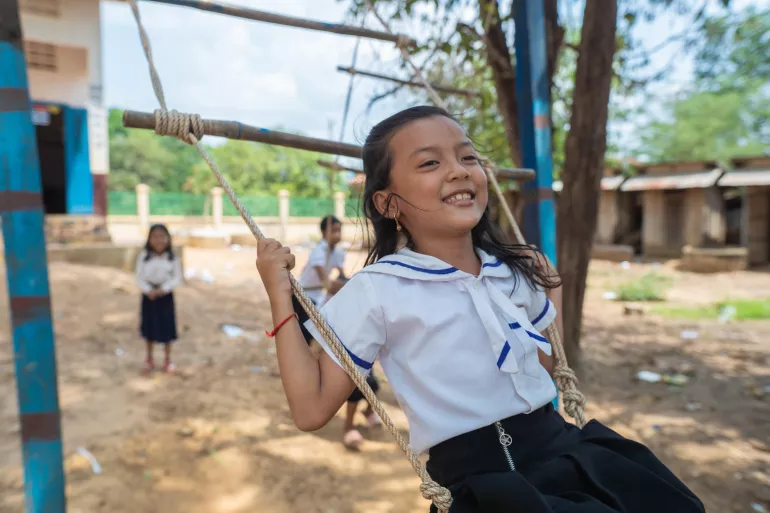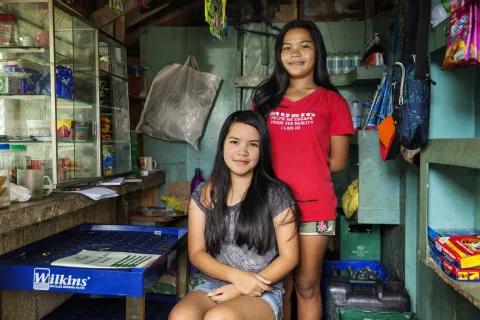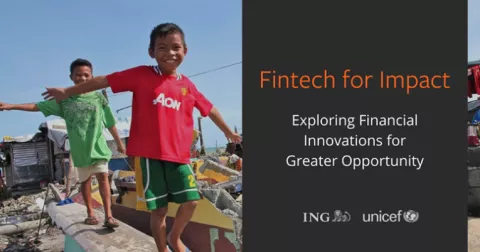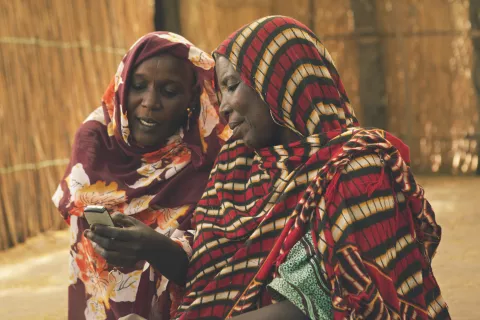5 fintech startups graduate from ING-UNICEF Fintech for Impact program
The 5 selected startups, who received equity-free funding and technical mentorship, have now graduated from the programme to offer greater opportunity and security to vulnerable children and families.

MANILA, 11 November 2021 —Five companies building financial technology (fintech) solutions for the Philippine market have shown promising potential after a year of mentorship by ING Bank, N.V. and UNICEF.
The five startups were selected and funded under ING and UNICEF’s Fintech for Impact investment program designed to accelerate their potential to launch new technology or tech-driven innovations.
The new digital financial tools they developed can help build economic security, encourage more equitable access to services, and lift financial barriers to opportunities to improve the lives of disadvantaged children, youth and families in the Philippines.
Working through the COVID-19 pandemic, shifting lockdowns, and numerous extreme weather events, these five startups had to find new ways of working and engaging with users on the ground, all while accelerating the development of their solutions given the clearer, more urgent need for social protection and financial stability. These startups are:
- Agrabah: With a platform that offers farmers and fisherfolk direct access to marketplaces and financing, Agrabah is helping stabilize and scale income for rural families. With the investment and mentorship, Agrabah has been able to connect over 3,000 farmers and fisherfolk to a new marketplace, enabling them to access agricultural loans – many for the first time – supported by Agrabah’s refined risk-rating system based on detailed crop availability and sales data.
- Beam&Go: The fintech aims to empower migrant workers and overseas foreign workers (OFWs) through their payment and digital marketplace that gives users control over how remittances are spent by their families. Through the platform, over 4,000 OFWs and their families have responsibly managed household finances and purchased goods, medicines, and school supplies; the team has also begun running a series of workshops to support OFWs toward repatriation.
- InvestEd: Developed for low-income and high-potential students, InvestEd’s student loan program will now be complemented by its online “Education-to-Adulthood" coaching platform and free, interactive educational content, so all young people can be supported on their path toward job security and financial wellness. During the investment, InvestEd has supported 700 borrowers and coached 650 students.
- reach52: The fintech boosted its suite of offline-first apps to empower local women who can earn while serving their own communities by connecting families to affordable medicines, health products, and health information and services while encouraging the use of digital payments. reach52 has trained and deployed 4,000 rural agents to serve over 130,000 people in hard-to-reach areas.
- Saphron: Through NAN.AI, an AI-powered tool, Saphron aims to improve efficiency for a primarily rural, female workforce of microinsurance agents (“nanays”) so they can reach more lower-income, rural families with affordable, accessible insurance. The tool, which includes scanning and digitization of handwritten forms, has helped 600 agents more quickly and efficiently insure over 100,000 people from accidents, disasters, and health emergencies.
As health systems have buckled and families have struggled to stay afloat through crises – with potential longer-term negative consequences for children – the world has started thinking about how to build back better. ING and UNICEF, through Fintech for Impact, have invested in the potential of developing open-source solutions as digital public goods – technology tools and services that are available for all to adapt and use.
Media contacts
About UNICEF
UNICEF promotes the rights and wellbeing of every child, in everything we do. Together with our partners, we work in 190 countries and territories to translate that commitment into practical action, focusing special effort on reaching the most vulnerable and excluded children, to the benefit of all children, everywhere.
For more information about UNICEF and its work for children, visit www.unicef.org.
Follow UNICEF on Twitter and Facebook
About ING
ING is a global financial institution with a strong European base, offering banking services through its operating company ING Bank. The purpose of ING Bank is empowering people to stay a step ahead in life and in business. ING Bank’s more than 57,000 employees offer retail and wholesale banking services to customers in over 40 countries.
ING Group shares are listed on the exchanges of Amsterdam (INGA NA, INGA.AS), Brussels and on the New York Stock Exchange (ADRs: ING US, ING.N).
Sustainability forms an integral part of ING’s strategy, evidenced by ING’s leading position in sector benchmarks.
ING's ESG rating by MSCI was upgraded to 'AA' in December 2020. ING Group shares are included in major sustainability and Environmental, Social and Governance (ESG) index products of leading providers STOXX, Morningstar and FTSE Russell. In January 2021, ING received an ESG evaluation score of 83 ('strong') from S&P Global Ratings.




